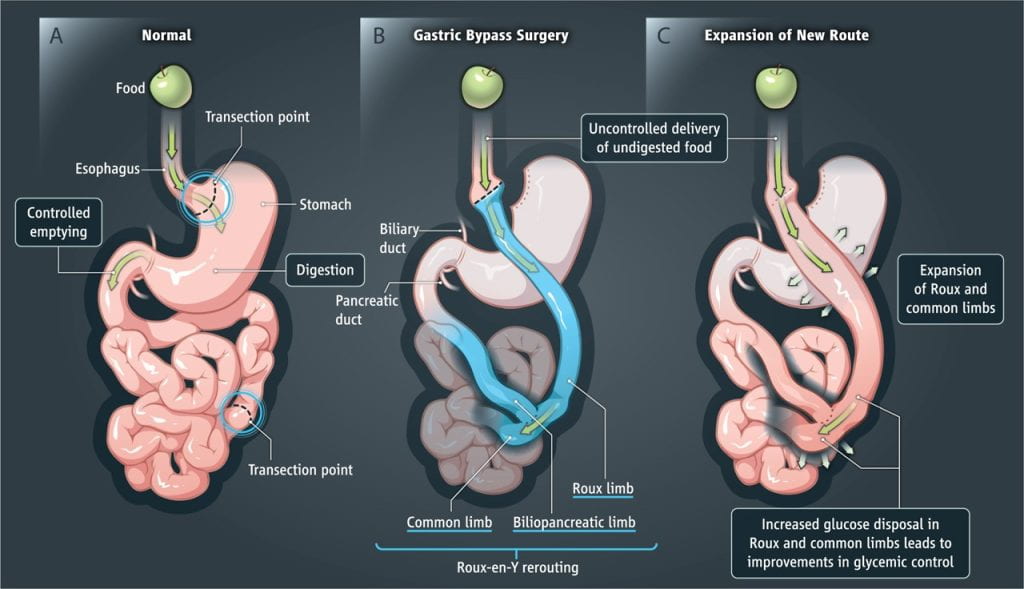Gastric bypass surgery is a type of weight loss surgery that involves dividing the stomach into two parts and rerouting the small intestine to both of these new stomach pouches. This procedure is designed to reduce the amount of food a person can eat, as well as the amount of nutrients their body absorbs.

Iran has a well-established healthcare system, and gastric bypass surgery is available in many hospitals and medical centers throughout the country. The cost of the surgery in Iran can be significantly lower compared to many other countries, making it a popular destination for medical tourism.
However, it is important to carefully research and choose a reputable and experienced surgeon and medical center for the procedure. It is also essential to have a thorough understanding of the risks and potential complications associated with gastric bypass surgery, as well as the necessary lifestyle changes and ongoing medical care required for successful weight loss and management.
تكميم المعدة في إيران is typically performed by highly trained and experienced bariatric surgeons in modern, well-equipped hospitals and clinics. The surgery is usually conducted using minimally invasive laparoscopic techniques, which involve making several small incisions in the abdomen rather than a large one. This approach results in less pain, scarring, and a quicker recovery time for the patient.
Patients who are considering gastric bypass surgery in Iran should first undergo a thorough medical evaluation to determine their eligibility for the procedure. They will also need to have a comprehensive pre-operative workup, including blood tests, imaging studies, and consultations with various medical specialists, such as a nutritionist, psychologist, and endocrinologist.

After the surgery, patients typically stay in the hospital for a few days for monitoring and recovery. They will also receive extensive post-operative care and support, including follow-up visits with their surgeon, nutritional counseling, and physical therapy.
As with any surgical procedure, there are potential risks and complications associated with gastric bypass surgery, including bleeding, infection, blood clots, and complications related to anesthesia. Patients should carefully consider these risks and discuss them with their surgeon before making a decision about whether to undergo the surgery.
Overall, gastric bypass surgery in Iran can be a safe and effective option for individuals who are struggling with obesity and have not had success with other weight loss methods. However, it is important to choose a reputable and experienced medical center and to have a thorough understanding of the risks, benefits, and ongoing care required for a successful outcome.
In addition to the medical aspects of gastric bypass surgery in Iran, it is also important to consider the logistics of traveling to the country for the procedure. Patients who are considering medical tourism should research the visa requirements, travel arrangements, and accommodations available in Iran, as well as any cultural or language barriers they may encounter.

It is also essential to carefully review the costs associated with gastric bypass surgery in Iran, including the cost of the procedure itself, as well as any additional expenses related to travel, accommodations, and post-operative care. Patients should compare the costs of gastric bypass surgery in Iran with those in their home country and weigh the potential savings against the potential risks and challenges of traveling for medical treatment.
Patients should also research the reputation of the medical center and surgeon they are considering, including their qualifications, experience, and patient reviews. It is important to choose a surgeon and medical center with a proven track record of success in performing gastric bypass surgery, as well as a commitment to providing high-quality care and support throughout the entire process.
Finally, patients who are considering gastric bypass surgery in Iran should have a realistic understanding of the outcomes and expectations associated with the procedure. While gastric bypass surgery can be an effective tool for weight loss and improved health, it is not a quick fix or a cure-all for obesity. Patients must be willing to commit to significant lifestyle changes, including a healthy diet and regular exercise, in order to achieve and maintain their weight loss goals.
Before undergoing gastric bypass surgery in Iran, patients will typically undergo a comprehensive medical evaluation to determine their eligibility for the procedure. This evaluation may include a physical exam, medical history review, blood tests, imaging studies, and consultations with various medical specialists, such as a nutritionist, psychologist, and endocrinologist.
Patients who are considering gastric bypass surgery should be prepared to make significant lifestyle changes in order to achieve and maintain their weight loss goals. These changes may include following a strict diet, participating in regular exercise and physical activity, and making other healthy lifestyle choices, such as quitting smoking and limiting alcohol consumption.
After the surgery, patients will need to carefully follow their surgeon’s post-operative instructions, including dietary guidelines, physical activity recommendations, and follow-up appointments. They may also need to take nutritional supplements to ensure that they are getting all of the necessary vitamins and minerals.

While gastric bypass surgery can be a highly effective tool for weight loss and improved health, it is not without risks and potential complications. Patients should carefully consider the potential risks and benefits of the surgery and discuss these with their surgeon before making a decision about whether to undergo the procedure.
Overall, gastric bypass surgery in Iran can be a safe and effective option for individuals who are struggling with obesity and have not had success with other weight loss methods. However, it is important to choose a reputable and experienced medical center and to carefully consider the risks, benefits, and ongoing care required for a successful outcome.